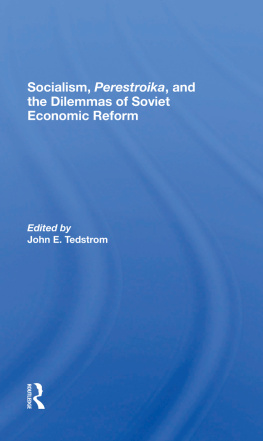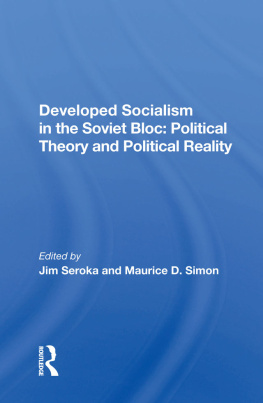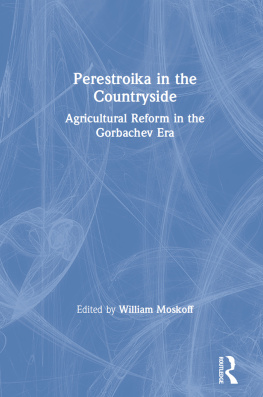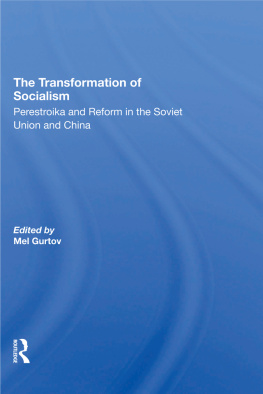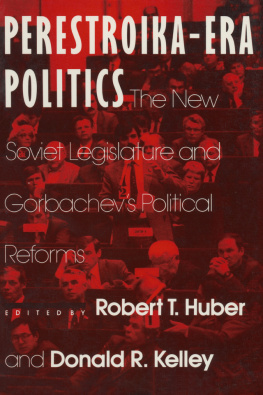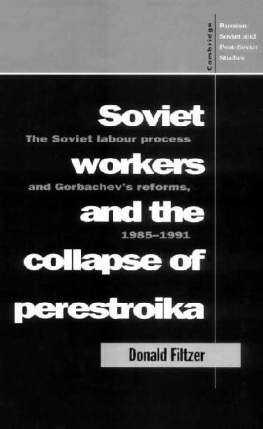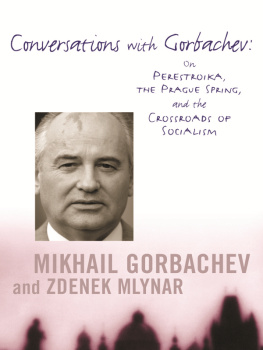Socialism, Perestroika, and the Dilemmas of Soviet Economic Reform
Published in cooperation with Radio Free Europe/Radio Liberty
Socialism, Perestroika , and the Dilemmas of Soviet Economic Reform
EDITED BY
John E. Tedstrom
First published 1990 by Westview Press
Published 2019 by Routledge
52 Vanderbilt Avenue, New York, NY 10017
2 Park Square, Milton Park, Abingdon, Oxon OX14 4RN
Routledge is an imprint of the Taylor & Francis Group, an informa business
Copyright 1990 by Taylor & Francis
All rights reserved. No part of this book may be reprinted or reproduced or utilised in any form or by any electronic, mechanical, or other means, now known or hereafter invented, including photocopying and recording, or in any information storage or retrieval system, without permission in writing from the publishers.
Notice:
Product or corporate names may be trademarks or registered trademarks, and are used only for identification and explanation without intent to infringe.
Library of Congress Cataloging-in-Publication Data
Socialism, perestroika , and the dilemmas of Soviet economic reform /
edited by John E. Tedstrom.
p. cm.
ISBN 0-8133-8017-0
1. Perestroika. 2. Soviet UnionEconomic policy1986
I. Tedstrom, John E.
HC336.26.S62 1990
338.947'009'048dc20 90-12137
CIP
ISBN 13: 978-0-367-28775-7 (hbk)
This book is the result of a conference held in the summer of 1989 at Radio Free Europe/Radio Liberty in Munich, West Germany. The subject of the conference was the process of economic modernization in the Soviet Union under perestroika. The authors offer a variety of institutional, disciplinary, and cultural perspectives on this subject.
A major theme that emerges in the chapters of this volume is that Soviet economic planners and politicians must come to recognize the need to make fundamental changes, not simply incremental refinements, in the failing Soviet system. For political leaders, this means addressing the issue of a multiparty system or at least of a more responsive and democratic legislature that can serve to check and balance executive power. For economic leaders, it means grappling with new institutional arrangements such as forms of private ownership which are fundamentally at odds with traditional Soviet policies and practices. Thus, the contributors to this volume devote less attention to the administrative and bureaucratic changes that have emerged under Gorbachev's leadership than to the fundamental steps that are required to make the Soviet economy work. They make clear that some of these necessary radical steps have been attempted, some have been only discussed and debated, and others have yet to be broached seriously at all.
A second major theme that emerges in this volume is that perestroika is a process, not an event and that it is too early to construct a balance sheet on its achievements, at least not one that has a bottom line. The contributors to this book examine the dynamics of the process of perestroika as much as they do the complexity of individual economic issues, and in so doing they elucidate the social pressures that to an increasing degree impel and inform Soviet economic policy.
The book is intended for a general audience, for all those interested in the transformations being ventured in the Soviet Union, as well as for specialists in Soviet-type economics.
S. Enders Wimbush
Director, Radio Liberty
This book is the product of many people's efforts, and I am indebted to them for their help. The management of RFE/RL, Inc., in particular Mr. S. Enders Wimbush, Director of Radio Liberty, and Mr. Gene Pell, President of RFE/RL, Inc., deserve much credit. They approved the conceptual, organizational, and budgetary questions that were involved not only in producing this volume but also in organizing and holding a conference in July, 1989, that generated early draft chapters. In a real sense, they made this project possible. A large note of thanks goes to Karen Whitehouse of the Radio Liberty Editorial Department. Without the assistance of Karen, the publishing process would have been a much more difficult experience. The assistance of Patricia Early and Burga Pattinson, both of Radio Liberty, was indispensable, from the early days of planning the conference through the final days of preparing the book.
A number of people either read draft chapters or participated in the conference. Wolfram Schrettl, Vladimir G. Treml, Mario Nuti, Christoph Royen, Theodor Schweisfurth, George Urban, Keith Bush, Erik Whitlock, Viktor Yasmann, O. Ralph Raymond, Charles Trumbull, Iain Elliot, D. J. Peterson, Michael Thompson, and Pierre Audiger deserve special mention. The usual caveats concerning responsibility for errors and omissions of course apply here. The contents of the book do not necessarily represent the views or policies of Radio Free Europe/Radio Liberty, Inc., or the Board for International Broadcasting.
John E. Tedstrom
John E. Tedstrom
The transformations undertaken in the Soviet Union and Eastern Europe in the late 1980s and early 1990s are likely to be looked upon by future analysts as among the most important political and economic developments in the twentieth century. Fundamental changes in both the domestic and foreign policies of the USSR have captured the attention of people throughout the world. Even if perestroika were to suffer a major setback, the process of social maturation in Soviet society has already gone too far to permit a full and permanent reversal. East-West tensions are at an all time low, in large part a result of initiatives taken by the Soviet Union within the rubric of "new thinking," reflecting the Soviet Union's desire to play a more positive role in global politics and economics. Internally, the USSR took what many have regarded as a decisive step towards democratization when it held and then honored the results of limited multicandidate elections to the new Soviet legislature, the Congress of People's Deputies. Soviet citizens took advantage of the opportunity presented to them by the elections to elect a number of reformist legislators and reject many Communist Party (CPSU) officials running on the ballot in constituency districts, even when the latter were running unopposed. After the first session of the Congress of People's Deputies, a radical pressure group consisting of nearly four hundred deputies and known as the Interregional Group was formed and has since taken a number of radical legislative initiatives. The formation of the People's Fronts in the Baltic republics a year or so earlier somewhat foreshadowed the development of autonomous political movements both at the grass-roots and at the legislative level. Such independent political formations have come to enjoy what amounts in many instances to veto power if not virtual control over political life in their respective republics. They are, for all practical purposes, independent political institutions often standing in opposition to the CPSU. The key difference between these popular movements and other new political institutions such as the Congress of People's Deputies and the restructured Supreme Soviet is that the latter have all been reforms la russe, or from the top down, initiated by the leadership in an effort to perpetuate whatever legitimacy it had in the face of the current systemic crisis. The popular movements (as well as numerous "informal" groups that have sprung up in Soviet society during the perestroika period) have, however, been grass-roots phenomenapopular will in action.


